
What a Train-Despatcher Does
by Charles De Lano Hine
with drawings by E.L. Blumenschein, ca. 1898
ALFRED THE GREAT did not have train despatchers in mind when
delivering the dictum attributed to him that a man should spend
eight hours in work, eight hours in eating and recreation, and
eight hours in sleep. This division of the day, for the benefit
of train-despatchers, into three eight-hour "tricks,"
as they are known in railway parlance, is one of the instances
of following along the lines laid down by the monarch who could
rule but, it is rumored, could not cook. Commercialism is rarely
altruistic, and the railroads work their train-despatchers only
eight hours because experience shows that the work is too exacting
to permit of a more prolonged effort without disastrous results.
The despatcher is monarch of more than he surveys, and one
of the few whose rule is absolute. His kingdom is charted on the
train sheet before him. His subjects are the conductors and enginemen,
the trains that they control, and the telegraph operators along
the line who communicate his royal pleasure. The wisdom of some
of his orders may be mentally questioned. The doubts of a weary
freight conductor may even find oral expression in a lonely telegraph
office at midnight to the effect that a ten-year-old boy ought
to know better than to order two long freight-trains to "saw
by" "Number Six" (the limited) at Millville; that
it must be pretty comfortable in the office when the despatcher
forgets that a hungry brakeman must trot half a mile in zero weather
to "flag." Be that as it may, the sway of the despatcher
is so absolute that no one ever thinks of trying to evade obedience
to a train order. Usually, when laws are severe, evasion follows
as a corollary; but disaster is too certain and too apparent for
this to be the case in the operation of trains.
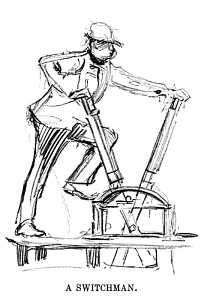 A train is said to "saw by" when the
side track is not long enough to hold the train or trains to be
met or passed. The first train then pulls by the switch at one
end of the siding, and stops just before reaching the switch at
the other end, where cars of the second train reach out over the
switch to the main track, and "foul the main." The A train is said to "saw by" when the
side track is not long enough to hold the train or trains to be
met or passed. The first train then pulls by the switch at one
end of the siding, and stops just before reaching the switch at
the other end, where cars of the second train reach out over the
switch to the main track, and "foul the main." The
second train then pulls through the siding, thus getting around
the first. A third train may also follow the second and pull around
the first. In case both the first and second trains are longer
than the siding, we "make a double saw," a very pretty
piece of work, though exasperating to all concerned from the delay
it causes. The "double saw," involving the "cutting"
of one train into two parts, so that the other may "take
hold" of one part, can easily be worked out by diagram on
paper.
Railroad men are eminently practical, and their expressions
and signals wonderfully suggestive and descriptive. The writer,
as a green brakeman, once crawled over the tender of the engine
to the cab, and with his switch-key in his teeth was going through
the cab window to the foot-board along the boiler, when he glanced
back and saw his conductor, on top of the first box-car, put his
hand to his forehead. The brakeman had never before seen this
signal, but it confirmed his idea as to the conductor's intentions,
for it meant "head in," that is, to take the next siding
by pulling in at the nearest switch. Had the conductor indicated
"back in" by putting his hand on the small of his back,
the train would have passed the nearest switch and backed in at
the switch at the farthest end of the siding. A moment after the
intelligent pantomime just described, the brakeman was riding
on that portion of the engine known as the "pilot" to
all except the dear old ladies from the country, who call it the
"cow-catcher." Just then the train was "flagged"
by a brakeman of another train; that is, the latter "swung
him down" with a red flag, meaning danger; stop!" "Him"
or "he" is a generic term, referring to the engineer,
or, as our English cousins more correctly say, the "engine-driver,"
while the locomotive, the thing driven, is appropriately designated
"her" or "she." So "he put her over and
called for 'em," which translated means that the engineman
threw over the reverse lever of the engine into the backward motion
and blew a sharp, warning blast of the whistle to apply the hand-brakes.
That was before the Interstate Commerce Law required full control
of freight-trains by automatic air-brakes, and when the "armstrong"
brake, operated by bone and sinew, was the main dependence. Fortunately,
in this train there were more "cars of air aworkin"'
than there were "bald heads" (cars without air-brakes),
and the engineman "pinched 'em up for a pretty stop."
The man on the pilot had measured with his eye the distance to
the "ditch" (side of the track), and had prepared to
"unload" (jump) if it turned out that the flagman had
not come far enough to protect his train. With a nonchalance most
reassuring, the said flagman wrapped up his flag and drew its
stick across his arm, after the manner of a violinist wielding
a bow. What could this mean but "saw by"? Then we sawed.
People saw wood and say nothing, but railroad men saw trains and
say things that are better left unprinted.
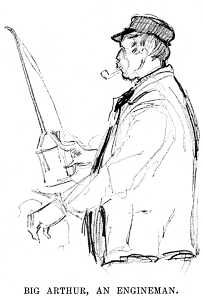 The despatcher "working a trick" has
the increased prestige which accompanies unseen authority. He
signs the initials of the chief despatcher, or the train-master,
or even of the mighty division superintendent himself. "Jim,"
the freight conductor, may address the despatcher, perhaps his
next door neighbor, as "Bill" when registering his train
before leaving the office to start from the terminal on a trip.
Jim may say with easy familiarity, "Bill, don't have us pick
up any cars this side of Hill Top tonight, for the 809 has leaky
flues, and that farmer of a fireman can't keep her hot."
Let Jim reach the first telegraph office, and such a request over
the wire would read: The despatcher "working a trick" has
the increased prestige which accompanies unseen authority. He
signs the initials of the chief despatcher, or the train-master,
or even of the mighty division superintendent himself. "Jim,"
the freight conductor, may address the despatcher, perhaps his
next door neighbor, as "Bill" when registering his train
before leaving the office to start from the terminal on a trip.
Jim may say with easy familiarity, "Bill, don't have us pick
up any cars this side of Hill Top tonight, for the 809 has leaky
flues, and that farmer of a fireman can't keep her hot."
Let Jim reach the first telegraph office, and such a request over
the wire would read:
Dk 1-19-01.
T. M.:
Can't move loads from Piedmont without doubling hill. Eng. 309
leaking & will not hold steam.
SMITH, Train 89.
The despatcher leaves his key, steps into the trainmaster's
office, and inquires: "Can I let Eighty-nine run the loads
at Piedmont and have Ninety-three move 'em?"
The train-master replies:
You know, Bill, the general superintendent has been after the
old man [superintendent] about our having a lower average train
tonnage than any other division on the system last month."
"Yes, sir; but Smith's a good conductor. The engineers
call him 'car-hungry,' he makes 'em pull so many, and he don't
lay down for nothing. Ninety-three won't have a full train because
we won't get the connection from the R., S. & P. road to-night.
They had a wreck over there to-day and piled 'em up pretty bad.
Then, too, if Eighty-nine stalls and leaves the hind end on the
main to double into Hill Top, they'll probably lay out Number
Five [delay the limited]."
The train-master decides in a hurry:
Let him run 'em, then. Maybe the motive power department will
get these old scrap heaps of engines in some kind of shape one
of these days."
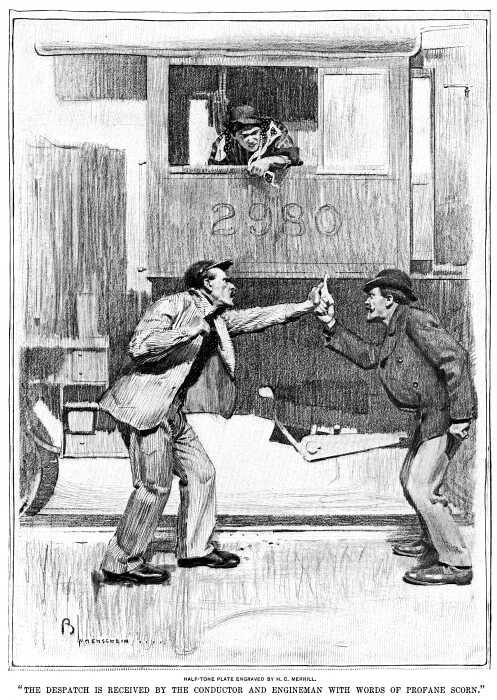 The train-master makes an entry in his vest-pocket
note-book to talk with the superintendent and the master mechanic
about this case. The despatcher now has five things to do: First,
he wires the conductor: The train-master makes an entry in his vest-pocket
note-book to talk with the superintendent and the master mechanic
about this case. The despatcher now has five things to do: First,
he wires the conductor:
Ab 1-19-01.
Smith,
89-Dk:
Run work at Piedmont.
T.M.
Second, he wires the yard-master at the terminal:
Ab 1-19-01.
Y. M.,
Xd:
Run 93 in shape to move 10 loads, 480 tons, from Piedmont.
T. M.
Third, he sends a message to the same terminal yard office
to be held until leaving-time:
Ab 1-19-01.
Cond'r 93,
Xd:
Move 10 loads, 430 tons, from Piedmont.
T. M.
Or, more laconically and indefinitely:
Cond'r 93,
Xd:
Clean out Piedmont.
T. M.
Fourth, he notes at the foot of the train sheet:
No. 89 unable to handle full tonnage acc't eng. 309 leaking.
Fifth, on the list of engine failures for the day for the superintendent
and the master mechanic, he puts:
Eng. 309 leaking, and could not handle full train from Piedmont.
It may be, however, that it is Conductor Jones, who has the
name of a shirk, a "smooth article," who is always trying
to avoid work, and who happens this time to have an engineman
with a like propensity. The story of the leaky engine does not
move the imperturbable despatcher. He does not have to consult
his superiors to send the pointed instruction ticked off by the
sounder at the other end:
Then double, but move the loads.
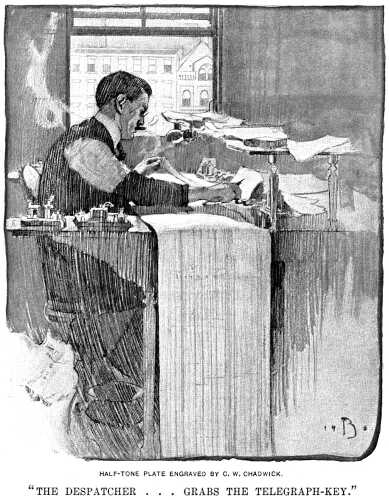 The despatch
is received by the conductor and engineman with words of profane
scorn, which the tears of the recording angel will blot out when
men, not saints, are candidates for heaven. They do their best.
The engineman goes to the village store and from his own pocket
buys a sack of bran, which he lifts up to the fireman to mix with
the water, saying: "Now keep her hot, sonny. This 'll help
her; but the hotter she is, the tighter them flues'll be. It's
a wonder that cigar sign of a roundhouse foreman wouldn't 'a'
corked [caulked] her when I put it on the book last trip."
It is different when, a day or two later, the despatcher, the
roundhouse foreman, and the engineman happen to meet near the
roundhouse. The well-dressed engineman, puffing comfortably at
a good cigar, as becomes the best paid man of the three, remarks
to the despatcher: "You sort o' put it to us on 89 the other
night, but I s'pose you had to." The despatch
is received by the conductor and engineman with words of profane
scorn, which the tears of the recording angel will blot out when
men, not saints, are candidates for heaven. They do their best.
The engineman goes to the village store and from his own pocket
buys a sack of bran, which he lifts up to the fireman to mix with
the water, saying: "Now keep her hot, sonny. This 'll help
her; but the hotter she is, the tighter them flues'll be. It's
a wonder that cigar sign of a roundhouse foreman wouldn't 'a'
corked [caulked] her when I put it on the book last trip."
It is different when, a day or two later, the despatcher, the
roundhouse foreman, and the engineman happen to meet near the
roundhouse. The well-dressed engineman, puffing comfortably at
a good cigar, as becomes the best paid man of the three, remarks
to the despatcher: "You sort o' put it to us on 89 the other
night, but I s'pose you had to."
"Yes, John; you know they are after us hot-foot to keep
up our tonnage record. You don't want the Summit division to beat
us, do you?"
"What! them scabs that got aboard over there time of the
A. R. U. strike in '94? Well, I guess nit," says the mollified
engineman. The roundhouse foreman brings more balm to Gilead by
saying: "Got them flues nice and tight for the 309 this trip.
She was leakin' like a sieve when she come in—almost died
on the turn-table before we could get her in the house. Wanted
to hold her in and fix her last trip, but it was a ground-hog
case of double right out. You know the 310 laid down on the big
bill and had to be towed in dead. Then the 208 threw a side rod
and come in on one side. If the power keeps on fallin' down this
good weather, I don't know what we'll do when winter comes."
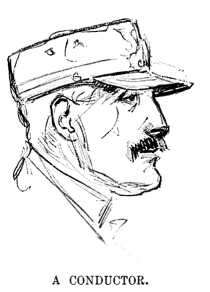 "Power,"
in the vernacular, means engines. In this case influence is not
the wife of power. Power also departs from general laws in that
it may die or be killed many times over. An engine is "dead"
when it has no steam or fire. If this condition occurs in the
roundhouse in the natural order of things, the engine is said
to be "cold," a term also applied when the engine has
not sufficient steam pressure to move herself. To "kill"
an engine is purposely to "draw" or extinguish the fire
to make repairs, or to prevent an explosion of the boiler when
the supply of water from the "tank" (tender) fails for
any reason, such as the injectors not working or the pipes freezing.
"Light power" is an engine without a train or with only
a very small part of a full train. "Power,"
in the vernacular, means engines. In this case influence is not
the wife of power. Power also departs from general laws in that
it may die or be killed many times over. An engine is "dead"
when it has no steam or fire. If this condition occurs in the
roundhouse in the natural order of things, the engine is said
to be "cold," a term also applied when the engine has
not sufficient steam pressure to move herself. To "kill"
an engine is purposely to "draw" or extinguish the fire
to make repairs, or to prevent an explosion of the boiler when
the supply of water from the "tank" (tender) fails for
any reason, such as the injectors not working or the pipes freezing.
"Light power" is an engine without a train or with only
a very small part of a full train.
The chief train-despatcher "handles the power," distributes
the cars to the various stations, decides what freight-trains
shall be run, and is in immediate charge of the countless details
that arise in the operation of trains. The duties of the superintendent
and the train-master keep them away from the office about half
the time, traveling up and down the line, stopping overnight at
important stations and terminals. The chief despatcher is always
at headquarters, and is the man of details. He is assisted by
a "trick despatcher" for each despatching district.
Like the sentinels at Gibraltar, the three trick despatchers never
leave their post unguarded. It may happen for a few minutes some
Sunday night that there is not a train running, "not a wheel
a-turnin' on the division," as the men say; but there sits
the despatcher, the ever-ready representative of the official
staff, the incarnation of alert administration. Where business
is heavy and the management is progressive, there is a night chief
also, who thus renders the position of chief despatcher uninterrupted.
These chiefs work twelve hours each, as the nervous tension is
less than that of a trick despatcher, who is "glued to the
train wire" his entire tour. In the absence of a night chief
the details at night are looked after by the trick despatcher,
whose work becomes much more responsible. The chief, in such a
case, usually comes down after supper and maps out the night-work,
and sometimes breaks in later with instructions on the train wire,
which is "cut in" at his room. The railroad man is seldom
entirely out of touch with his work. The telegraph sounder lulls
the tired chief to rest, and wakes him in the morning. So trained
is his ear that, if wanted at night, the despatcher has to "pound"
the private call on the wire only a few times to elicit a response
from the sleeping chief. On Sundays the chief is on hand most
of the day, in obedience to the unwritten railroad commandment:
"Six days shalt thou labor, and the seventh come down to
the office and catch up." In most occupations, "all
work and no play makes Jack a dull boy," but in railroading
it makes him a bright boy, so stimulating and fascinating is the
excitement of the work.
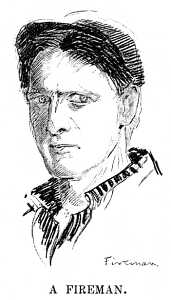 The chief
despatcher "handles the power," that is, he sends the
engines where they are needed. This is not so easy as it looks.
It is far from profitable to "run light power," for
the wages must be paid the train crew and the engine crew just
the same, although the train is earning no money for "the
company." The men always say "the company" when
referring to the "soulless corporation" employing them,
just as the commercial traveler says "the house," or
the insurance man "the home office." The "standard
pay" per mile in the freight service is four cents for enginemen,
about two and one half cents for firemen, three cents for conductors,
and two cents for brakemen. A day is counted as one hundred miles,
the approximate length of short freight runs. A freight crew consists
usually of two brakemen, sometimes three, a conductor, an engineman,
and a fireman, making a total daily wage-list of about thirteen
dollars and a half. On many roads this is the largest single item
of expense, and leaving aside the overtime paid on badly delayed
trains, it is the same whether the engine pulls only the unprofitable
caboose, or the full capacity, say fifty revenue-producing cars.
The cost of fuel and locomotive supplies will vary directly with
the load hauled. It would be easier if freight could be allowed
to accumulate at one end of the line until enough "showed
up" at the other to make full trains both ways. Sometimes
this can be done in the case of grain, coal, ore, and other low-class
freight, where the immense surplus at the point of receipt renders
prompt movement unnecessary, if not undesirable. High-class freight,
such as live stock, dressed meat, and fresh vegetables, must,
from its perishable nature, be given prompt movement to prevent
increased deterioration in transit. Other high-class freight,
like merchandise, oil, and household goods, must move because
needed by the consignees. Then, too, the volume of business handled
for a powerful and exacting shipper in competitive territory may
forbid delay. The writer as yard-master more than once "flagged
supper" (went without) to help his company retain the business
of a well-known soap firm, which had to float if all other traffic
sank. Sometimes, too, freight has to be moved from a congested
yard to make room for other freight that is "in sight"
(reported by wire) from connecting roads or neighboring divisions. The chief
despatcher "handles the power," that is, he sends the
engines where they are needed. This is not so easy as it looks.
It is far from profitable to "run light power," for
the wages must be paid the train crew and the engine crew just
the same, although the train is earning no money for "the
company." The men always say "the company" when
referring to the "soulless corporation" employing them,
just as the commercial traveler says "the house," or
the insurance man "the home office." The "standard
pay" per mile in the freight service is four cents for enginemen,
about two and one half cents for firemen, three cents for conductors,
and two cents for brakemen. A day is counted as one hundred miles,
the approximate length of short freight runs. A freight crew consists
usually of two brakemen, sometimes three, a conductor, an engineman,
and a fireman, making a total daily wage-list of about thirteen
dollars and a half. On many roads this is the largest single item
of expense, and leaving aside the overtime paid on badly delayed
trains, it is the same whether the engine pulls only the unprofitable
caboose, or the full capacity, say fifty revenue-producing cars.
The cost of fuel and locomotive supplies will vary directly with
the load hauled. It would be easier if freight could be allowed
to accumulate at one end of the line until enough "showed
up" at the other to make full trains both ways. Sometimes
this can be done in the case of grain, coal, ore, and other low-class
freight, where the immense surplus at the point of receipt renders
prompt movement unnecessary, if not undesirable. High-class freight,
such as live stock, dressed meat, and fresh vegetables, must,
from its perishable nature, be given prompt movement to prevent
increased deterioration in transit. Other high-class freight,
like merchandise, oil, and household goods, must move because
needed by the consignees. Then, too, the volume of business handled
for a powerful and exacting shipper in competitive territory may
forbid delay. The writer as yard-master more than once "flagged
supper" (went without) to help his company retain the business
of a well-known soap firm, which had to float if all other traffic
sank. Sometimes, too, freight has to be moved from a congested
yard to make room for other freight that is "in sight"
(reported by wire) from connecting roads or neighboring divisions.
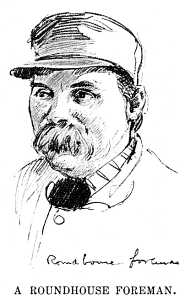 The chief
despatcher knows all this by practical experience. He probably
began as a telegraph operator along the line when a mere lad.
His alertness on the wire at night, when operators are prone to
doze, attracted the attention of the despatcher, who mentioned
him to the chief one day when an operator was needed to "copy"
in the despatcher's office. A few years of "copying"
messages from the wire at headquarters, next a day job, then an
extra night despatcher, in turn a regular despatcher, and finally,
in the prime of life, chief despatcher, with the hope of becoming
trainmaster next time, unless the best yard-master on the line
or a bright young conductor lands the prize, or the civil engineer
of the division, instead of the train-master, becomes superintendent.
The busy, Topsy-like life of the chief despatcher has given him
little time for study. He knows not the rules of political economy,
the laws of trade, the principles of theoretical mechanics, but
he does know every hump and hollow, every hill and sag, every
curve and bridge on the "old pike" (railroad). He knows
the disposition of every trainman, engineman, and operator on
his line. He knows how fast each engine can run, how much she
can pull, the height of her drivers, the size of her cylinders,
and the steam-pressure at which she "pops" (safety-valve
blows off). More than that, he can tell how many cars each side
track holds, how many cars will "block" (blockade) the
various yards. He knows how many empty cars there should be at
each station to handle the business offered. The weather report
to him means good roads or bad roads, and he can guess pretty
nearly how much grain and hay the farmers will haul to the stations
next week. He knows what freight to hold to make trains of full
tonnage, what to "rush" regardless of cost to save his
immediate superiors a reprimand from the general offices. He knows
where to get bold of extra passenger-cars for heavy travel, how
long to hold fast trains for connections, when to start these
trains on time and run a second section with the connection. He
knows, without looking at the "detour map," what road
to ask to handle his trains from any given point in case of a
wreck or a washout. He has little time for church and prayer meeting;
but here again practical experience is his teacher. His whole
training is direct, untrammeled by dogma or by creed. He knows
that loyalty to the company and to the public who trust him means
the approval of his own conscience and the goodwill of his fellow-men.
The chief despatcher unconsciously adopts the belief of Martin
Luther that to work is to pray, and so, without knowing it, becomes
among the most devout of men. The chief
despatcher knows all this by practical experience. He probably
began as a telegraph operator along the line when a mere lad.
His alertness on the wire at night, when operators are prone to
doze, attracted the attention of the despatcher, who mentioned
him to the chief one day when an operator was needed to "copy"
in the despatcher's office. A few years of "copying"
messages from the wire at headquarters, next a day job, then an
extra night despatcher, in turn a regular despatcher, and finally,
in the prime of life, chief despatcher, with the hope of becoming
trainmaster next time, unless the best yard-master on the line
or a bright young conductor lands the prize, or the civil engineer
of the division, instead of the train-master, becomes superintendent.
The busy, Topsy-like life of the chief despatcher has given him
little time for study. He knows not the rules of political economy,
the laws of trade, the principles of theoretical mechanics, but
he does know every hump and hollow, every hill and sag, every
curve and bridge on the "old pike" (railroad). He knows
the disposition of every trainman, engineman, and operator on
his line. He knows how fast each engine can run, how much she
can pull, the height of her drivers, the size of her cylinders,
and the steam-pressure at which she "pops" (safety-valve
blows off). More than that, he can tell how many cars each side
track holds, how many cars will "block" (blockade) the
various yards. He knows how many empty cars there should be at
each station to handle the business offered. The weather report
to him means good roads or bad roads, and he can guess pretty
nearly how much grain and hay the farmers will haul to the stations
next week. He knows what freight to hold to make trains of full
tonnage, what to "rush" regardless of cost to save his
immediate superiors a reprimand from the general offices. He knows
where to get bold of extra passenger-cars for heavy travel, how
long to hold fast trains for connections, when to start these
trains on time and run a second section with the connection. He
knows, without looking at the "detour map," what road
to ask to handle his trains from any given point in case of a
wreck or a washout. He has little time for church and prayer meeting;
but here again practical experience is his teacher. His whole
training is direct, untrammeled by dogma or by creed. He knows
that loyalty to the company and to the public who trust him means
the approval of his own conscience and the goodwill of his fellow-men.
The chief despatcher unconsciously adopts the belief of Martin
Luther that to work is to pray, and so, without knowing it, becomes
among the most devout of men.
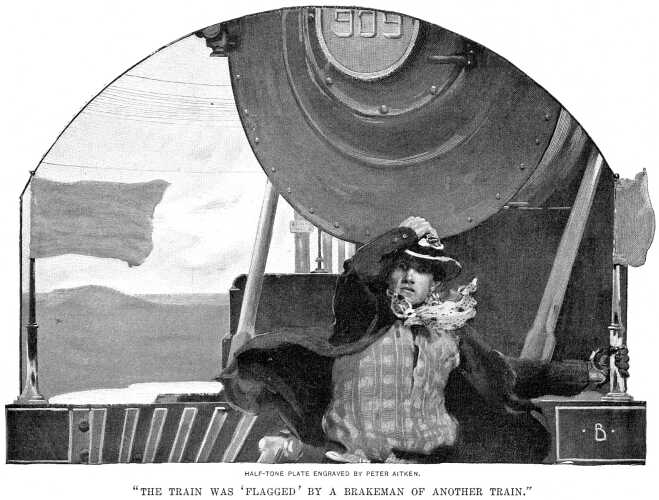
The chief despatcher, then, with his information, has to "figure"
on his power. Railroad men use the verb "to figure"
in its good old comprehensive sense of planning, devising, calculating,
scheming, and using head-work generally. Political economists
often claim that the so-called practical man of affairs is an
obstacle to progress and reform. Whether this be so or not, the
practical man is frequently hampered by the statistician, who,
like other technical men, is prone to intrench himself behind
a barricade of figures. So it is with the chief despatcher. Business
may be running very heavy eastbound without a corresponding volume
west-bound. The chief may have to run six "lights" west
to "protect" the movement of life stock expected from
the West. Suppose previous west-bound trains have "cleaned
out" the eastern terminal, but the stations and industries
along the line have loaded sufficient cars west to make one train.
It is a single-track road, and there will be some delay to even
these light trains in waiting on side tracks to meet trains coming
east. Common sense would dictate that the work of "picking
up" these cars be divided among the six trains, certain stations
being assigned to each to "clean out" where they are
most likely to be delayed for other trains. In practice it is
often possible to do this without appreciable delay, and all six,
having only a small fraction of a full train, can "get over
the road in good shape," closing up in groups of two or three
at meeting or passing points. But no; as "lights" are
omitted in computations of tonnage, this would spoil the average
train-load per mile. The gentlemen who revel in statistics for
the financial reviews would declare that the road was not well
operated, that the new general manager was not pursuing a policy
calculated to enhance the value of its securities. The writer
as train-master some times had on a passing track at a junction
point a "light" which could not, under instructions,
move some important loads from the business track adjacent. These
had to wait for a following section, which was dragging along
with a heavy train, and which arrived at the next terminal six
hours behind the "light." The connections and other
combinations of circumstances were such that this made a difference
in final delivery of twenty-four hours, a considerable item to
the "shipper," as all freight patrons are termed, who
was putting up his good money for modern service.
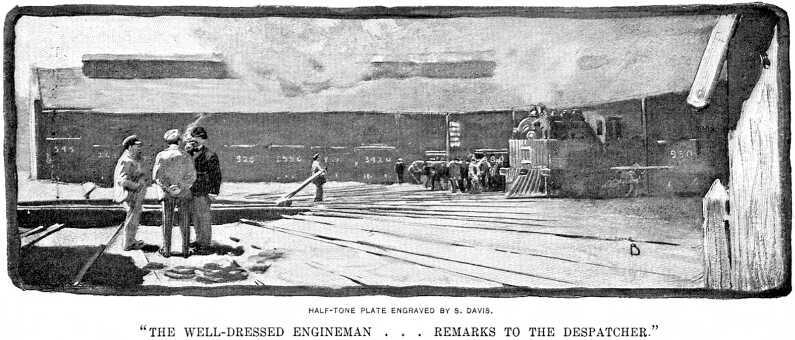
The spasmodic character of railroad business adds to the difficulty
of operation. Today there will be a comfortable volume of business
to handle. Tomorrow it will come with a rush from apparently unrelated
sources. The writer learned by experience, whenever a certain
southern connection reported a large consignment of bananas "in
sight," to look for heavy shipments of building-stone from
the western connection at the same junction-point. Another fact
that was never satisfactorily explained was that, no matter what
day the passenger department selected to advertise and run a couple
of excursion trains, that very day witnessed the heaviest freight
movement of the week. Every additional train adds to the strain
on the nerves of the chief despatcher and the despatcher. The
chief has to "figure" the cheapest way to get "power"
and men ready to run the trains, and the despatcher has to get
them over the road nicely after they are ready. Most railroads
in America are single-track, and to handle a train in each direction
every hour is no simple task.
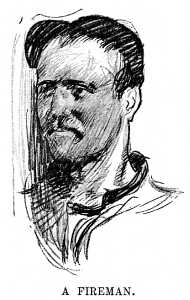 Train-despatching
has been reduced to a scientific system, virtually uniform on
all the roads of the country. All systems depend for successful
operation on the ability of individuals, and in the case of train-despatchers
that ability is not wanting. Movements of trains are based primarily
on the "working time-table," the general law governing
their rights and privileges—a very different-looking document
from the hand some illustrated" folder" which enlightens
the traveling public. The train orders issued by the despatcher
are supplementary to the time-table. They reach the special cases
not covered by the general law. East-bound and north-bound trains
are designated by the even numbers, west-bound and south-bound
trains by the odd numbers. Trains are divided into classes, usually
from two to four, so that a train of inferior class knows from
the time-table to keep entirely out of the way of a superior train.
Thus the fast passenger-trains are first-class, and their train
numbers run, say, between one and twenty. The slow accommodation
trains are second-class, and may be numbered in the twenties and
thirties. The fast freights may come in the third class, in the
forties and fifties. The slow freights and way freights then become
fourth-class, in the sixties and seventies. Train-despatching
has been reduced to a scientific system, virtually uniform on
all the roads of the country. All systems depend for successful
operation on the ability of individuals, and in the case of train-despatchers
that ability is not wanting. Movements of trains are based primarily
on the "working time-table," the general law governing
their rights and privileges—a very different-looking document
from the hand some illustrated" folder" which enlightens
the traveling public. The train orders issued by the despatcher
are supplementary to the time-table. They reach the special cases
not covered by the general law. East-bound and north-bound trains
are designated by the even numbers, west-bound and south-bound
trains by the odd numbers. Trains are divided into classes, usually
from two to four, so that a train of inferior class knows from
the time-table to keep entirely out of the way of a superior train.
Thus the fast passenger-trains are first-class, and their train
numbers run, say, between one and twenty. The slow accommodation
trains are second-class, and may be numbered in the twenties and
thirties. The fast freights may come in the third class, in the
forties and fifties. The slow freights and way freights then become
fourth-class, in the sixties and seventies.
On some large roads a hundred numbers are reserved for each
class of trains. The present practice is to give a train the same
number on all the roads over which it runs. Thus a traveler leaving
New York on Number Eleven reaches St. Louis on Number Eleven the
next evening, by which time another Number Eleven has left New
York. No confusion results, as the train has passed over three
different roads, with a total of nine time-table despatching districts.
It has taken nine sets of despatchers and operators, five train
crews, and probably seven engines to render this service, to say
nothing of terminal work and track and bridge maintenance.
The traveler who attempts to compute the revenue of the train
is apt to forget all this, and to magnify the reasonable rate
he is charged for benefits conferred. He wonders why the allied
lines do not declare dividends of thirty or forty per cent.
With the classes of trains clearly in mind, it must be remembered
that, as between two trains of the same class, direction gives
precedence. East of the Rocky Mountains most roads make east-bound
or northbound the superior direction. On the Pacific slope, where
the seaport is in the opposite direction, westbound or south-bound
is usually made superior. Thus, on an Eastern road with trains
classified as above indicated, Number Two, Number Four, Number
Six, etc., would have absolute right, under the time-table, to
use the road regardless of all other trains. Regular trains, being
creations of the timetable, are not allowed to run ahead of the
time it prescribes at each station. Number One, Number Three,
Number Five, etc., would have to keep off the time of the first-class
trains in the superior direction, but could disregard all other
classes of trains. The lower the class the greater the number
of trains to remember and to keep clear of. This part is done
by the conductor and engineman, who are held equally responsible
for the safety of their own train. The conductor "runs train";
the engineman runs the engine and "pulls the train";
while the despatcher "runs trains."
An "extry" (extra train) has no timetable status.
It derives its existence from a train order from the despatcher
in the following form:
Eng. 2 will run extra from Manila to Dagupan.
Or, if a work-train:
Eng. 3 will work as an extra between Santiago and Siboney from
7 A.M. till 6 P.M.
This order gives the extra no right to use the main track on
the time of any regular train. It must run only when it can dodge
regular trains. It pays no attention to other extra trains unless
required by train order to do so. To prevent confusion, an extra
train is distinguished by two white flags, usually dirty, or two
white lights on the front of the engine near the headlight. In
the handling of extra trains the despatcher must be most careful,
since they are run entirely by telegraph. If he forgets and runs
two extras in the same limits without a provision in orders for
them to meet or to look out for each other, he has given the dreaded
"lap order," which means a collision unless the trains
happen to sight each other on straight track in time to stop.
Sometimes after a lap order has been given, a fortunate circumstance,
like a breakdown, prevents "gettin' 'em together." The
feelings of a despatcher who discovers his error too late to remedy,
but in time to order the wreck-train and surgeons to be ready
before he knows just where the wreck has occurred or how many
are killed or injured, are not enviable, to say the least. A decrepit
old crossing-flagman, like most of his class a worn-out track-hand,
was once recommended by the oculist for dismissal on the ground
of color-blindness and insufficient intelligence. The writer had
happened to be near when the old man's quick wit and prompt flagging
both ways prevented a collision after a lap order had been given.
This practical test was allowed to outweigh all theoretical considerations,
and the old man still keeps a faithful watch.
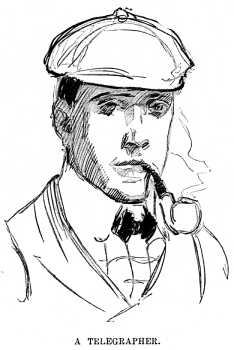 In case it
is desired to run more than one train on the same time-table schedule,
this train is run in as many sections as may be necessary, each
section, except the last, being ordered to "carry"
or display signals, which means that two green flags or two green
lights are shown on the front of the engine near the headlight
to indicate that a train of equal rank is following. The following
section or sections may be held for connections and not be started
for some time. Then the despatcher "helps" inferior
trains along with an order reading: In case it
is desired to run more than one train on the same time-table schedule,
this train is run in as many sections as may be necessary, each
section, except the last, being ordered to "carry"
or display signals, which means that two green flags or two green
lights are shown on the front of the engine near the headlight
to indicate that a train of equal rank is following. The following
section or sections may be held for connections and not be started
for some time. Then the despatcher "helps" inferior
trains along with an order reading:
2d No. 10 will run two (2) hours late from Mexico to Tula.
3d No. 10 will run three (3) hours and twenty (20) mins. late
from Mexico to Salamanca.
The green "classification signals" on the engine
should not be confused with the green "markers" on the
rear of every train. The markers simply indicate to enginemen
and operators that the cars of the train are "all a-comin"';
that none have been lost off or obstruct the "block"
(space between telegraph stations) in the rear.
The essential feature of modern train-despatching is the "double-order
system," under which all trains affected receive, by telegraph,
exact copies in manifold of the same order, thus minimizing the
possibility of misunderstanding. To insure accuracy, each operator
receiving the order repeats it back to the despatcher before taking
further action. The conductor, and on some roads the engineman
also, signs his name to the order. This signature is then wired
to the despatcher, who, when convinced that the copy for the ruling
or superior train is in proper hands, directs "Complete"
to be written on the copy signed. Without the "Complete"
the order must not be delivered or used, but becomes a holding
order to keep the train from running until "Complete,"
assuring safety, is given by the despatcher. These are only the
outlines of an elaborate system, built on the experience of disasters,
to safeguard life and property against the fallibility of human
agencies.
Every operator has to "o.s." (on sheet) a train when
it leaves or passes his station; that is, he wires the despatcher's
office the train number and the hour and minute of arrival and
departure. On the train sheet in the despatcher's office this
time is entered in the column which represents the particular
train and on the line opposite the station name. The names of
the stations are in a wide column in the middle, the eastbound
trains (columns) being on one side and the west-bound on the other.
As the trains rush by the stations, the figures of one direction
creep from bottom to top, of the other from top to bottom. The
despatcher can thus see on the sheet the trains approaching each
other. He can tell where, if let alone, they will overtake each
other, or where they will meet. If every train could be kept exactly
on time, if there were no additional sections, no extra trains,
the problem would work itself out according to the time-table.
There are too many variable elements in the equation to admit
of such a solution. Delays may result from a thousand and one
legitimate causes, and are as unavoidable as original sin in man.
The moment a train "falls down" (becomes delayed) the
despatcher must watch to see that opposing trains receive "help"
by order. Perhaps he can help the train itself against a superior
train which can stand a slight delay. So he "stabs"
(delays) the superior train to prevent the inferior train being
"snowed" (badly delayed by a combination of superior
trains), knowing that a few minutes can be made up by the first,
but that a further delay at this stage to the second cannot be
overcome. While this is occurring, there may be another combination
forty miles more down the line requiring an exactly opposite remedy,
and a third fifty miles farther yet demanding a third kind of
treatment. The despatcher, always clear-headed but coatless, takes
a pull at the ever-present, nerve-soothing cigar, and bitching
up his shirt-sleeves, grabs the telegraph-key to "jerk lightning,"
no less valiantly but much more discreetly than did Ajax of old.
Stories Page | Contents Page
|







